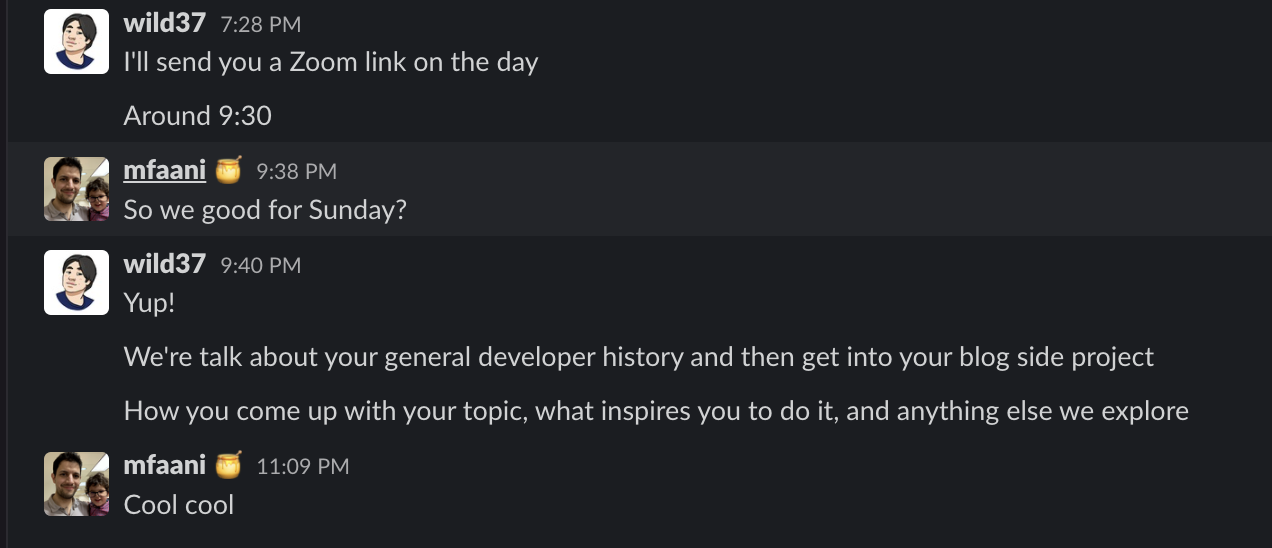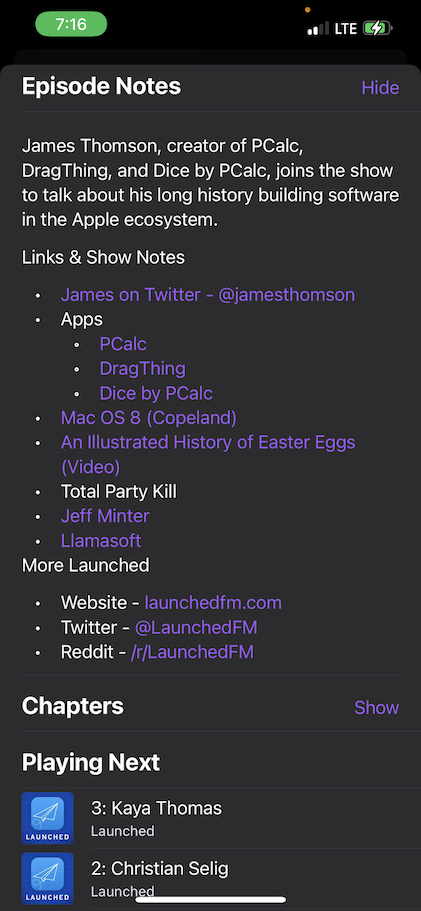The first time I listened to an iOS podcast was yrs ago. I was struggling to grasp basic iOS concepts and podcasts weren’t really covering basic technical material. It just didn’t seem like the right way of learning about things. Two weeks ago I got invited to Side Project Spotlight Podcast. I was thrilled but also clueless. Had to do some googling, listen to a few episodes and purchase some equipment. Here are the things I learned throughout the process.
Talking points
- Ask for an overview of what’s going to be discussed from your host. This is what my host told me:

- Be prepare to introduce yourself. Practice it out. Talk about where you live. What you currently do. How you got into Programming. Where you’re the most active. But also talk about your non-programming life.
- Just because the order of a previous episode of the podcast was A then B then C, it doesn’t mean your talk will have the same order of sections. Your host can do whatever they want, however they feel. Everything is relaxed. Podcasts to meetings are much like meetups to conferences.
- Stories and conversations are what’s important. Have a few stories prepared. It can be about:
- Failures
- Journeys
- Leadership
- Friendships
- Inspirations
- First job or hiring experiences
- Challenge or Success
- Funny incidents
- Product
- Team
For the most part the conversation just flows naturally. Your rehearsing just helps. Don’t be too technical. Nor speak in length.
How to Talk
-
Speak slow and clear.
-
Have a professional microphone. AirPods aren’t professional microphones 🫠🫠🫠.
- I ended buying a Blue Yeti Nano for $69.99. There were some more premium products, but from the feedback I got, it seemed like a good choice.
- Reduce any possible noise (heater, fan, kids, tv) in your room.
- Test it. Watch a Youtube video on the microphone on its correct position/angle. I needed to reduce the microphone gain (the output volume of your microphone) as it was my headphones' output as well.
- Getting early to the recording is helpful to get feedback on your audio from the host, because they they likely have more experience than you. Also you may not notice that you’re using your computer’s built-in microphone. A standard way of testing is to rub the microphone with your nail and ask if others can hear it. Often setting the input at the OS level doesn’t adjust the input device. Fix is easy. You just need to set input for Zoom.
- Pro tip: If you’re using a mic, then make sure you accompany it with a headphone, otherwise your microphone will echo the the sound it hears. You won’t notice this until you get to the meeting where people are talking back and forth
- I also learned about ‘Pop Filters’. For more on that see this video. I ended up not buying one and things just worked fine.
-
Here’s an example of how AirPods compare with a Yeti Nano:
AirPods2
Blue Yeti Nano
- It’s ok to have a few hiccups in your speaking. But it’s good to know if you over-use something too much. Through out my talk I realized I overused the term “I feel like” 🤦♂️.
- Speak with energy. Ask a friend to ask a few questions for a few minutes. Record that it. Make it a conversation, so you can gauge your energy level easier. Listen to it and see if your energy is good enough. Energy doesn’t mean being loud but after hearing the recording, I often felt like I was too shy or my voice was low.
Other tips
- You’re the guest. But that doesn’t mean it’s going to be all you talking. Empty your cup, your hosts have things to share as well. Everyone there is to share and learn. Truth to be told, towards the end I was asked about “what’s next?” and paused. I realized I didn’t have a good answer. But the insight that Kotaro and Stephen offered was really helpful.
- Don’t interrupt anyone. Nor lose your patience if they go on a streak or pivot just as you were to hit your climax. You can pivot too 😀.
- Your talk will likely be on Zoom. It makes the conversation more alive and easier for you to read visual cues for when someone is about to talk. And because Zoom is used, then wear nice clothes and have a decent camera background and remain attentive.
- Don’t try to correct your hosts. You may be incorrect yourself. If you really needed then first check if the host is giving room for correction. Like instead of saying “That’s incorrect / You’re wrong”. Just go with “I thought it was like …. instead. No?” and if they gave you signals that they’re willing to hear more, then indulge them with more stuff.
- If there’s anything you don’t want talking about then, let your host know of it days before, not just before the conversation. Be candid but also comfortable about it.
- If something was discussed in the conversation that you didn’t like or was just too off-topic, then just continue with the conversation. Often the hosts pivot a bit early in the talk, just to have enough content to select from. It’s like a director doing different cuts so they can later choose the best recording. Still if there was something you really didn’t want released then just ask your host to remove those sections. I asked for something to be removed. They were 100% onboard.
- It’s ok to go a bit over time, because there will be some editing and shrinkage. So plan ahead for this as well.
- Others can’t see your screen or others may be hearing about you for the first time or have a hard time understanding your accent. I was listening to this Podcast and the person had some (English) accent and I couldn’t tell if they were saying ‘Peacock’ or ‘Peak calk’. Turns out they were actually saying PCalc. 🤦♂️ e.g. you might need to spell out your Twitter handle or blog name letter by letter. The alternative to that is to mention: “Look into the show notes”. Hosts are really good for filling this information. But you must also be prepared to help with filling the information.

Philly CocoaHeads + Side Project Spotlight shout out🔊
I would like to officially give thanks to all the Philly CocoaHeads community for supporting me through the years by answering my questions (I’m known for asking a lot of questions). Facilitating meetups and inviting me to this wonderful podcast. Special shout out to Stephen Tolton, Kotaro Fujita and Aaron Bilenky whom all gave me this opportunity. They changed my perception of Podcasts. I’ve started listening a lot more since then.
Side Project Spotlight is associated with Philly CocoaHeads. Their podcast is for app builders, documenting the process of producing real apps for the Apple App Store.
You can subscribe to their podcast through their different mediums. My episode (aired on May 9th, 2022) can also be accessed from here